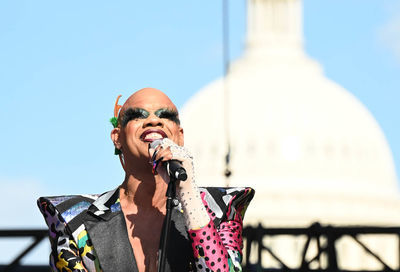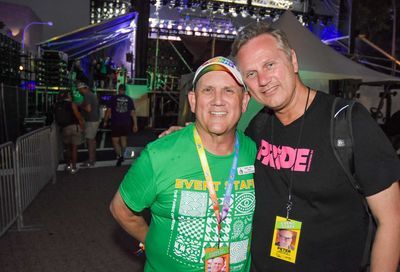‘Avengers: Endgame’ features the MCU’s first openly gay character
But background character "Grieving Man" is hardly worth getting excited about

Avengers: Endgame is a historic film for many reasons — not least the shattering of box office records around the world over the weekend.
But Marvel’s magnum opus, its culmination of 11 years of building the Marvel Cinematic Universe (MCU), is also notable because it features the franchise’s first-ever openly gay character.
*Very minor spoilers follow. If you’re trying to avoid them at all costs, click here to read one of our other excellent articles.*
The film is predominantly set five years after Thanos’ infamous “snap” in Avengers: Infinity War wipes out half of the universe’s inhabitants.
The Avengers are scattered across Earth and the galaxy, trying to move on, still trying to combat evil, or trying to find out how to bring everyone back.
Captain America (Chris Evans) is first seen hosting a survivor support group, which features an unnamed character (he’s listed as Grieving Man in the credits) discussing a recent date he went on.
The man, played by one of Endgame‘s directors, Joe Russo, describes his date with “he” pronouns, making it clear that the man is gay (or bisexual, of course, but we’re working with what the film gives us).
In this scene, the MCU introduces its first ever on-screen LGBTQ character, and it’s something the Russos — Anthony being the other — are apparently pretty proud of.
“Representation is really important. It was important to us as we did four of these films, we wanted a gay character somewhere in them,” Joe Russo told Deadline.
The moment was so important that the Russos also agreed that one of them should play the character, to show how committed they are to representation.
“We felt it was important that one of us play him, to ensure the integrity and show it is so important to the filmmakers that one of us is representing that,” Russo said, adding, “It is a perfect time, because one of the things that is compelling about the Marvel Universe moving forward is its focus on diversity.”
Anthony Russo added: “The fact that the character is gay will get attention but it isn’t where the scene started. When you have a story point that includes killing half of all humans on Earth, you’re telling a bigger story than The Avengers. So that scene was important to us in telling the story of the larger world. ‘We wanted to have a voice that was talking about the experience of people that went beyond The Avengers. That’s why we felt we really needed it in the movie. Otherwise, it just became too hermetic and insular. That character that Joe is playing really came from that point of view, him being an everyman who has suffered from Thanos’ act.”
Joe Russo noted that the character’s inclusion was their way of making clear, “As filmmakers of a massive franchise we’re saying, we support you.”
It’s perhaps honorable that the Russos were determined to include an LGBTQ character in Endgame, and it comes after a Marvel executive recently said that “the world is ready” for a gay superhero, after rumors suggested Marvel was seeking to cast an openly gay actor for one of the lead roles in The Eternals.
And Marvel Studios president Kevin Feige had previously teased last year that there would be at least two LGBTQ characters in the studio’s upcoming films.
Brie Larson, who plays Captain Marvel, also said this week that she wants better LGBTQ representation in MCU films, telling Variety‘s The Big Ticket podcast that “there’s no reason” not to have an LGBTQ hero.
“I don’t understand how you could think that a certain type of person isn’t allowed to be a superhero,” she said. “So to me it’s like, we gotta move faster. But I’m always wanting to move faster with this stuff.”
But, in the grand scheme of the MCU, with its 22 currently released films, a single gay character — one who doesn’t even get a name — hardly smacks of openly embracing the LGBTQ community or giving LGBTQ people fair representation in Marvel’s films.
It also comes after the studio has been repeatedly criticized for allegedly straight-washing its films, including removing a lesbian romance from Black Panther and cutting a scene from Thor: Ragnarok that would have shown Valkyrie (Tessa Thompson) as bisexual — the character is canonically bisexual in the comics.
It seems that the Russos’ attempts to represent LGBTQ people has also fallen foul of fans on social media, who have dragged the studio for Grieving Man’s brief appearance in the film.
“I’ve never felt more represented watching a film unnamed character #38 us a gay icon,” one user wrote.

Another said they were “still laughing that the first openly gay person in MCU is a stranger in a grieving session.”
*VERY SLIGHT AVENGERS ENDGAME SPOILER*
I'm still laughing that the first openly gay person in MCU is a stranger in a grieving session
— Dan the Dancer ✨ (@DVruno) April 27, 2019
Someone else warned those who hadn’t seen the film that the gay representation in Endgame is “laughable.”
ACTUALLY i just wanna say the gay rep in endgame is laughable and exactly what i expected so dont get ur hopes up or anything sndjjsdjjsks
— SAM 🌸 watched endgame! (@kindIespark) April 24, 2019
User @serumsobs noted that the Russos had ignored calls from fans to allow one of the MCUs multitude of existing heroes to come out.
Russos: how do we show we fuck with the gays
Us: make one of the 50+ superheros openly queer because its important and statistically more correct than all being straight
Joe russo: ooh you know what imma make this useless scene and play gay
Im so strong for this— steph (@serumsobs) April 28, 2019
Though perhaps film writer Scott Weinberg said it best:
"After 22 films we thought an openly gay, completely anonymous character should have three full lines of dialogue."
— Scott Weinberg (@scottEweinberg) April 27, 2019
Support Metro Weekly’s Journalism
These are challenging times for news organizations. And yet it’s crucial we stay active and provide vital resources and information to both our local readers and the world. So won’t you please take a moment and consider supporting Metro Weekly with a membership? For as little as $5 a month, you can help ensure Metro Weekly magazine and MetroWeekly.com remain free, viable resources as we provide the best, most diverse, culturally-resonant LGBTQ coverage in both the D.C. region and around the world. Memberships come with exclusive perks and discounts, your own personal digital delivery of each week’s magazine (and an archive), access to our Member's Lounge when it launches this fall, and exclusive members-only items like Metro Weekly Membership Mugs and Tote Bags! Check out all our membership levels here and please join us today!


























You must be logged in to post a comment.